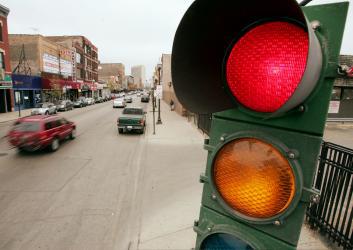We already know that Dallas is a good city in which to shoplift. Apparently it’s a great place to run a red light, too. Scott Goldstein at the Dallas Morning News reports that the Dallas Police Department wrote 37,000 fewer traffic tickets in fiscal year 2012–2013 than in the previous fiscal year. While lead-footed scofflaws were ticketed 248,835 times in FY 11–12, they were only hit 211,843 times in FY 12–13. Ticket numbers have been steadily declining since FY 06–07, when Dallas cops issued 495,007 citations. Get thee to Texas, reckless drivers!
This, of course, means a dip in traffic-ticket revenue for the city of Dallas. Police Chief David Brown, however, says that’s not his concern: “The purpose of traffic enforcement is to improve traffic safety, not to raise revenue,” he said in a statement issued to the media. Anyone who has ever been caught in a gratuitous speed trap will likely stand up and cheer Brown’s response, but his statement doesn’t tell the whole story. As the Morning News’ Goldstein astutely pointed out, there’s another reason for the ticketing decline: “The Dallas Police Department, like its counterparts in other big U.S. cities, has shifted resources to concentrate on fighting violent crimes and property crimes, offenses that are reported to the FBI and widely used to assess the overall safety of cities.” It’s not that the DPD doesn’t want to be writing tickets and raising revenue, it’s that doing so doesn’t make the city safer in a way that can be bragged about publicly.
Maybe that’s too cynical. Running a modern police department is an exercise in resource prioritization. With a limited number of cops and a finite budget that, in many places, only seems to decrease, police departments cannot treat every crime report equally. They have to pick and choose, and for many departments, the correct choice is to focus on serious felonies while deprioritizing enforcement of and response to minor matters.
But then there’s the question of how you define “minor matters.” In Las Vegas, for instance, if you are shot but not killed, the police department will put very little institutional effort into finding the shooter. As J. Patrick Coolican at the Las Vegas Sun has reported, the LVPD concentrates its resources on solving homicides, at the expense of other, nonmurderous violent crimes. In cash-strapped Chicago, CPD Superintendent Garry McCarthy has poured human resources and overtime payments into policing a few homicide-heavy “hot zones”; elsewhere in the city, the department has announced that 911 calls involving thefts, burglaries, and other nonviolent, nonimmediate incidents will no longer be speedily answered. In a perfect world, all of these cities, including Dallas, wouldn’t have to make these tough choices. But if I’m a Dallas resident, I wouldn’t be displeased with the choice the city seems to have made.
